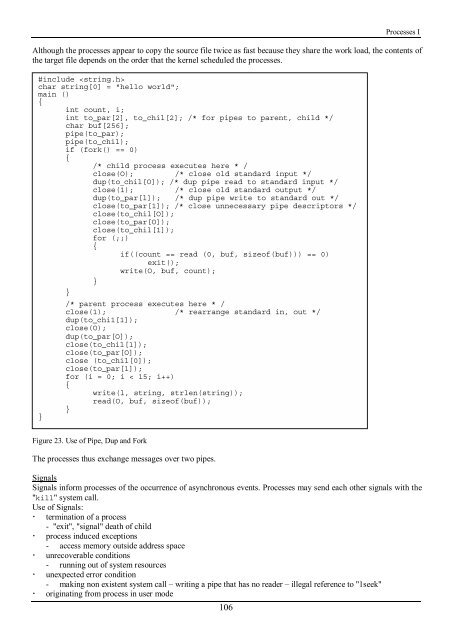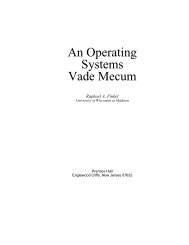Create successful ePaper yourself
Turn your PDF publications into a flip-book with our unique Google optimized e-Paper software.
Processes I<br />
Although <strong>the</strong> processes appear to copy <strong>the</strong> source file twice as fast because <strong>the</strong>y share <strong>the</strong> work load, <strong>the</strong> contents of<br />
<strong>the</strong> target file depends on <strong>the</strong> order that <strong>the</strong> kernel scheduled <strong>the</strong> processes.<br />
#include <br />
char string[0] = "hello world";<br />
main ()<br />
{<br />
int count, i;<br />
int to_par[2], to_chil[2]; /* for pipes to parent, child */<br />
char buf[256];<br />
pipe(to_par);<br />
pipe(to_chil);<br />
if (fork() == 0)<br />
{<br />
/* child process executes here * /<br />
close(O); /* close old standard input */<br />
dup(to_chil[O]); /* dup pipe read to standard input */<br />
close(1); /* close old standard output */<br />
dup(to_par[l]); /* dup pipe write to standard out */<br />
close(to_par[1]); /* close unnecessary pipe descriptors */<br />
close(to_chil[O]);<br />
close(to_par[O]);<br />
close(to_chil[1]);<br />
for (;;)<br />
{<br />
if((count == read (0, buf, sizeof(buf))) == 0)<br />
exit();<br />
write(O, buf, count);<br />
}<br />
}<br />
/* parent process executes here * /<br />
close(1); /* rearrange standard in, out */<br />
dup(to_chi1[1]);<br />
close(O);<br />
dup(to_par[O]);<br />
close(to_chil[1]);<br />
close(to_par[O]);<br />
close (to_chil[0]);<br />
close(to_par[1]);<br />
for (i = 0; i < 15; i++)<br />
{<br />
write(l, string, strlen(string));<br />
read(O, buf, sizeof(buf));<br />
}<br />
}<br />
Figure 23. Use of Pipe, Dup and Fork<br />
The processes thus exchange messages over two pipes.<br />
Signals<br />
Signals inform processes of <strong>the</strong> occurrence of asynchronous events. Processes may send each o<strong>the</strong>r signals <strong>with</strong> <strong>the</strong><br />
"kill" system call.<br />
Use of Signals:<br />
! termination of a process<br />
- "exit", "signal" death of child<br />
! process induced exceptions<br />
- access memory outside address space<br />
! unrecoverable conditions<br />
- running out of system resources<br />
! unexpected error condition<br />
- making non existent system call – writing a pipe that has no reader – illegal reference to "1seek"<br />
! originating from process in user mode<br />
106
















